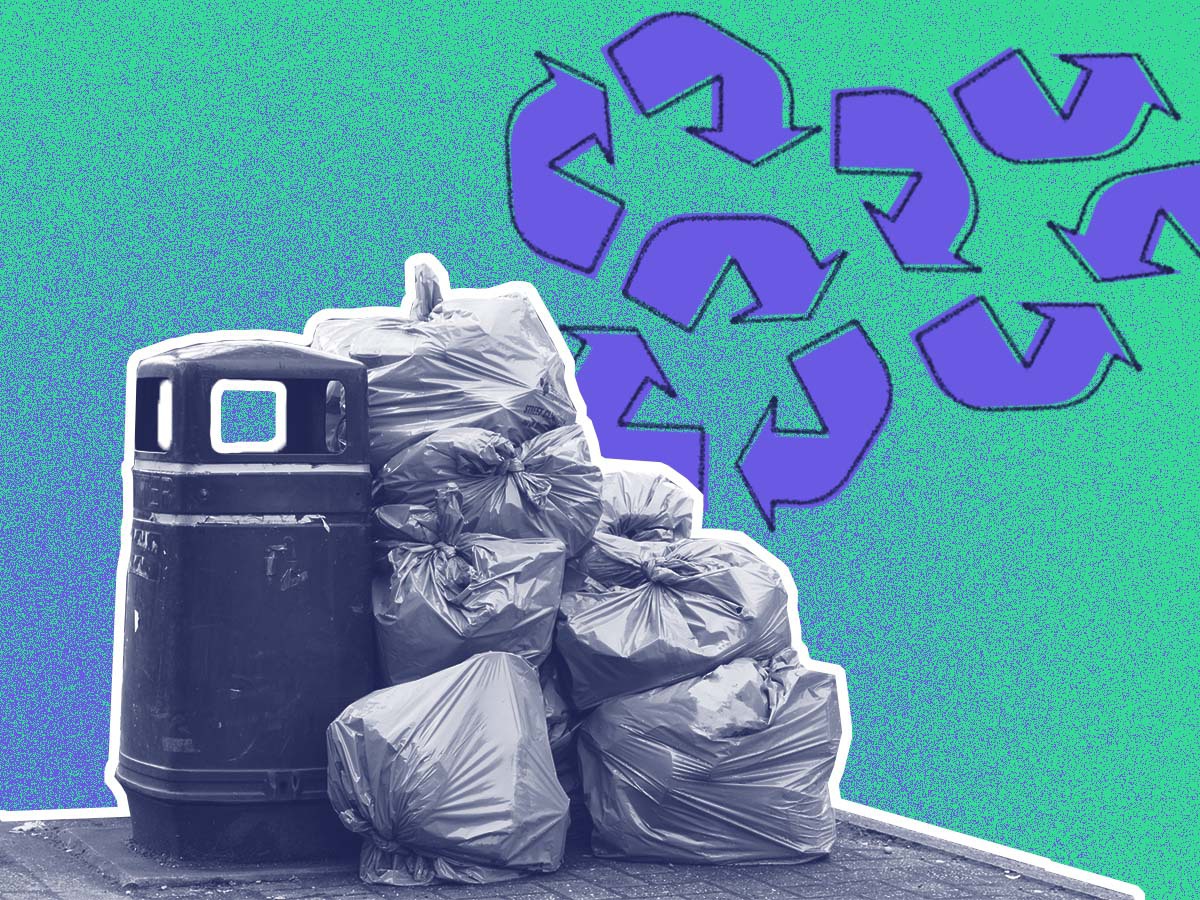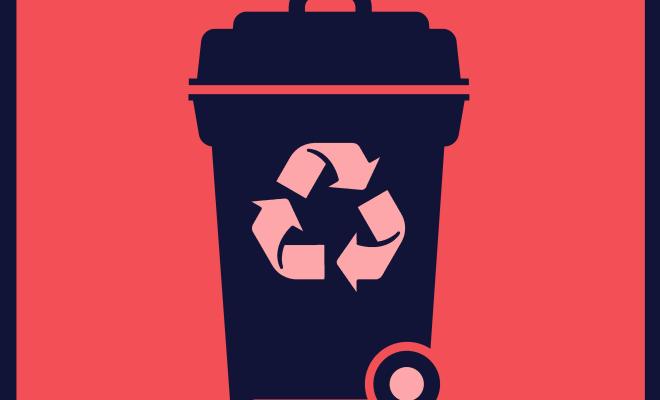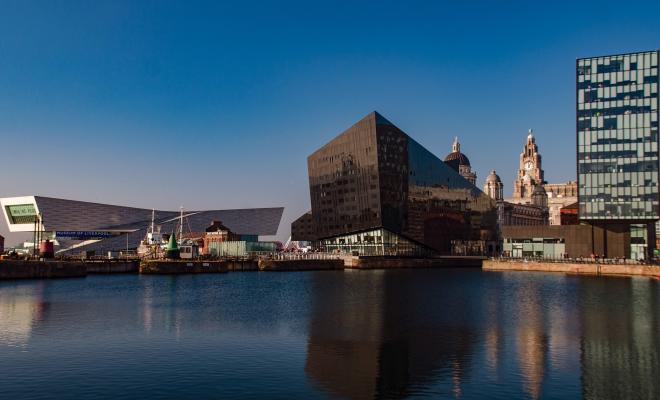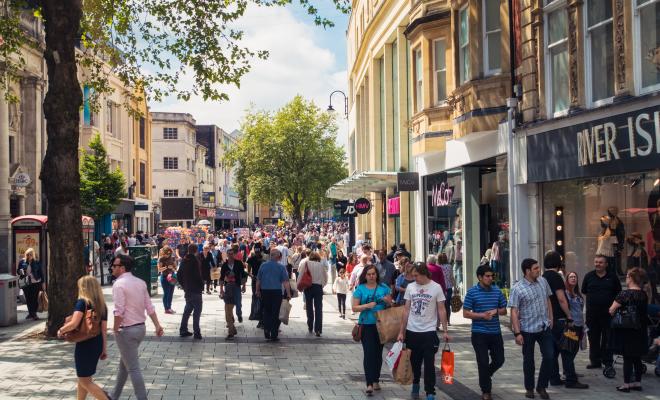23 May 2022
How is Action 38 tackling the climate crisis?
Waste is a climate issue due to the emissions caused by manufacturing products that are then thrown away, and due to the methane gases released at landfill sites.
Derry City and Strabane District Council is one of the first local authorities in the UK to create a zero waste circular economy strategy which it defines as an economy where “resources are used for as long as possible, have maximum value extracted from them and are recovered and regenerated at the end of their service life to achieve a zero waste circular economy”.
This is a core element of the region’s Inclusive Strategic Growth Plan and has helped the area win the Zero Waste City Region designation from Zero Waste Europe.
The strategy has 3 key aims. In order of priority, they are:
- Preventing waste creation in the first place, encouraging reuse, improving the design of products, and extending product life cycles.
- Encouraging its preparation for re-use.
- Delivering separate waste collections for recycling, composting and digestion.
The council seeks to ensure that residual waste which is unable to be recycled is treated prior to disposal, to reduce its environmental impact.
The authority has outlined 37 key policy actions that will help it cut/eliminate waste and pollution from council services and activity, increase the re-use of materials and products and develop regenerative natural systems.
To make these plans achievable, the council is attempting to shift local attitudes and behaviour to redefine waste as a vital resource. Its tactics are changes to collection methods combined with public education on issues.
The council is also moving its focus away from the percentages and amounts of different materials gathered for recycling to the quality of the material eventually produced through the recycling process. This is important in creating future value on the commodity market as part of a circular economy.
Key examples of implementing circular-economy waste policies into plans and contracts
Reuse and recycling
The local authority is upgrading its household waste and recycling centres and expanding food and garden waste collections to reduce the number of valuable waste materials entering landfills. In summer 2020, the council worked with Northern Ireland’s Department of Agriculture, Environment and Rural Affairs to deliver 14,600 new garden waste bins to homes in the region, allowing for locals to easily separate their garden waste from landfill waste.
The council is also developing a re-use and recycle economy through a partnership with New2You Reuse Centre, a local social enterprise. This partnership aims to educate residents on how to mend furniture or electrical products, helping to reduce the impact of our throwaway culture and providing useful skills that could potentially help with finding jobs.
Initiatives include the She Shed Project, which trains women aged between 18 and 35 on basic construction skills such as joinery, painting and decorating, mechanics and upcycling. The council also has a reuse and repair centre at their Pennyburn recycling site, where locals can learn skills such as bike and clothing repairs at upcycling workshops.
Green procurement strategy
The council has also introduced green procurement policies into plans and contracts. It is in the process of adopting new criteria for all purchasing activity. It is already implementing green procurement plans with local events and festivals. Its Greening Our Festivals and Events checklist (which is integrated into tender specifications for services) requires service providers to offer better waste disposal options, such as waste segregation, and more efficient energy use at events like implementing deposit return schemes for cups.
Council events feature demonstration tents where in-house recycling and horticulture teams show the public how circular economy practices work in real life. Activities like demonstrating how peelings can be turned into compost for food-growing help to encourage wider behaviour change.
Local and sustainable food
Food management is a key to creating a circular economy. Derry and Strabane view sustainable food production as a key priority. Its ultimate goal is a city that feeds itself.
The council is supporting a local food growing movement through the "I Can Grow" project at the authority-owned Acorn Farm. This project, run in partnership with The Community Foundation, The Conservation Volunteers and University College Cork, is guiding 260 families through a food-growing journey. They learn how to grow food sustainably, using compost from the council’s food and garden waste recycling,
The council also works with local food and drink providers through the Legenderry Food Network, which promotes sustainable food and drink practices. To be a member of the network, a minimum of five food and drink items have to be sourced locally.
Refurbished laptops
A laptop donation scheme has helped children who had no access to a device with homeschooling during the pandemic. In partnership with North West Greenway Network, Sustrans and Zero Waste North West, 400 laptops were refurbished. The project also prompted wider action from the government.
What impact has the project had?
Action to raise awareness and spark behavioural change across the region is already starting to have an impact. Before the development of a circular economy plan, the council had the lowest recycling rates in Northern Ireland at only 33%. By March 2021, this rate had increased to 48%. Its landfill rates are also falling, from 14.38% in April 2019-March 2020 to 8.87% in April 2020-March 2021.
There are also social impacts being delivered including the mental and physical health benefits of the food growing project and educational benefits of the laptop project.
It is important to consider that many innovative impacts from this strategy will be effective in the long term, such as influencing product design and re-localising the processing of waste into useful materials.
What made this work?
Working in collaboration
A fundamental aspect to getting wide buy-in for circular economy plans is to work in collaboration with other partners. A key partner for developing and implementing the overall strategy has been Zero Waste North West. The grassroots organisation play an important role in developing policy actions, as well as supporting the council with wider public engagement to encourage behaviour change related to re-use and recycling.
Adopting the business case for implementing circular economy into plans
With the council under increasing financial pressure, there is a strong business case for adding circular economy waste policies into city plans. There are clear economic benefits to designing a system that can extract value from better management of products.
The council estimate its annual bill for waste management to be £10.2 million and believes that adopting circular economy principles can create savings of £3.1 million per year, while also creating over 190 new green jobs. Furthermore, over 90% of dry recyclable materials handled by the council are exported, creating a potential loss of value and employment opportunities that could be kept within the local economy.
Use of technology
Another key factor to the council’s success has been the development of technology as a means for engagement, including:
- The European Union-founded Emergreen Project, which helps local people access information on waste through the development of a chat-box tool on the council’s website, a waste app and a new recycling website.
- The City Deal Programme with Ulster University, which supports digital innovation and manufacturing technologies to test designs that make waste products easier to reuse and recycle.
What resources were needed?
Resources to fund the new strategic plan for developing a circular economy came through the council’s sustainability budget. Additional funding was secured for further implementation of policies. For example, funding was secured from DAERA Kerbside Recycling Transformation Programme to allow for a further rollout of waste collections, while funding for the local food growing project "I Can Grow" was secured through the National Lottery Climate Action Fund.
Lessons from Derry and Strabane
Set up internal circular economy working groups
In order to ensure its strategy and policy actions are delivered, the local authority set up a series of internal circular economy working groups. These groups develop procurement criteria, measure impacts and work with local stakeholders to create sustainability checklists and pledges.
Friends of the Earth's view
Cutting waste is important but this isn’t just about waste as Derry and Strabane is taking a joined-up approach to delivering local economic benefits and reskilling local people.
This case study is one to watch as the council moves ahead with its plans to shift local attitudes and behaviour.
Some councils may want to tackle their own waste first including getting rid of all single-use plastic (Action 40 of the Climate Action Plan).
Friends of the Earth is showcasing specific examples of good practice in tackling climate change, but that doesn’t mean we endorse everything that a council is doing.
This case study was produced by Ashden and Friends of the Earth.





